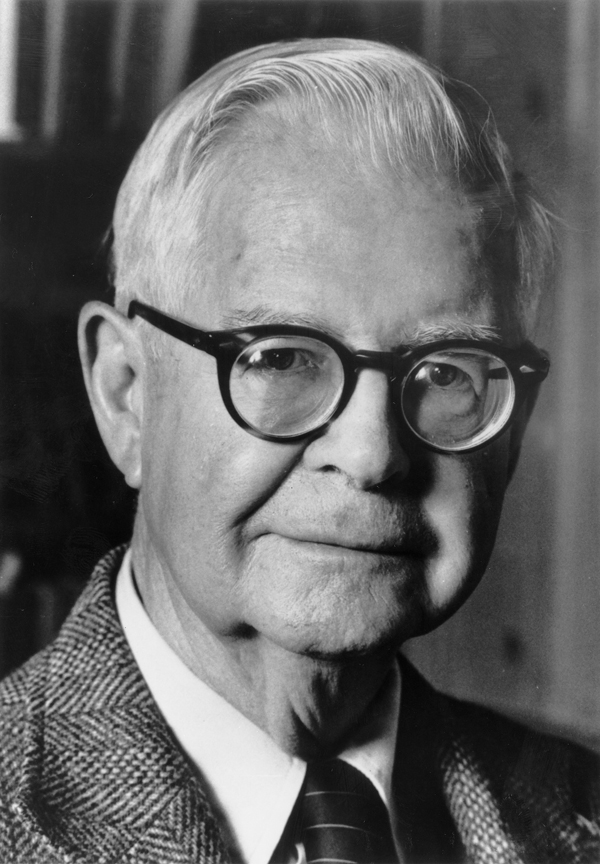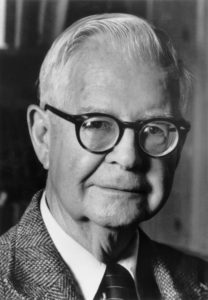Cleanth Brooks
Cleanth Brooks, one of the foremost American literary critics of the twentieth century, spent fifteen years as a professor in the English Department at Louisiana State University (LSU).

Courtesy of Yale University
Cleanth Brooks. Marsland, Michael (Photographer)
Cleanth Brooks, one of the foremost American literary critics of the twentieth century, spent fifteen years as a professor in the English Department at Louisiana State University (LSU). He was the central architect of the “New Criticism,” a critical movement that transformed the teaching of literature in the United States. The author of The Well Wrought Urn and coeditor, with Robert Penn Warren, of the groundbreaking anthology Understanding Poetry, Brooks brought fresh attention to literary form and the practice of close reading. He profoundly influenced American literary studies and shaped successive generations of students and teachers of literature with his work.
Born October 16, 1906, in Murray, Kentucky, Cleanth Brooks, Jr., was the son of Cleanth Brooks, Sr., and Bessie Lee Witherspoon Brooks. Because his father was a Methodist minister, Brooks moved repeatedly during his childhood. He attended the McTyeire School in McKenzie, Tennessee, and then Vanderbilt University. Brooks attended Vanderbilt in the mid-1920s, when it was the site of exceptional literary activity. At Vanderbilt, a group of poets produced a short-lived yet influential poetry magazine, The Fugitive, while a group of twelve scholars, known as the Nashville Agrarians, issued the anti-industrial manifesto I’ll Take My Stand in 1930. Brooks formed enduring relationships with many of the writers from the Fugitive and Agrarian movements, such as John Crowe Ransom, Donald Davidson, Allan Tate, and Robert Penn Warren.
After Vanderbilt, Brooks did graduate work at Tulane University and at Oxford University as a Rhodes Scholar. In 1932, he joined the faculty of the English Department at LSU, where he served until 1947. At the beginning of his tenure, then governor Huey Long dramatically increased the school’s funding, initiating a literary renaissance in the English Department. Brooks’s colleague from Vanderbilt, Robert Penn Warren, joined the faculty around the same time, and together they founded The Southern Review in 1935. It eventually served as a model for literary journals across the United States.
A prolific writer and scholar, Brooks edited several anthologies, primarily with Warren as coeditor. He also published major studies on Faulkner, language, and the history of literary criticism. Brooks opposed several of the dominant critical assumptions of his time, including the ideas that form and content can be separated in literature, that a poem had a paraphrasable core of meaning, and that a poem’s meaning was primarily dependent on its context. Instead, Brooks argued that a poem’s meaning derived from an internal relationship between its individual components. A poem was an “organic” whole that acquired unity through a balanced resolution of paradox, a concept he considered fundamental to the language of poetry. The methodology Books and others developed, often referred to as New Criticism, influenced generations of literary scholars.
In 1942, LSU temporarily disbanded The Southern Review, prompting Brooks and Warren to seek employment elsewhere; both ultimately settled at Yale, where Brooks took a position in 1947. Named the first Gray Professor of Rhetoric at Yale in 1961, he retired in 1975 but continued lecturing for many years. He died May 10, 1994.
While no longer the main theoretical basis for literary scholarship, the New Criticism remains indispensable to classroom instruction and anthology formation. A number of Brooks’s younger colleagues and students at Yale went on to establish or revise approaches to literary study that constitute in their various ways a response to the New Criticism. Whether through a continuation of his views or in conscious divergence from them, American literary criticism owes a major debt to Cleanth Brooks.
